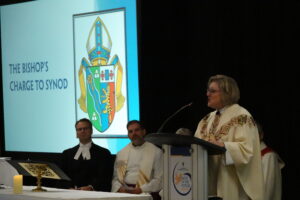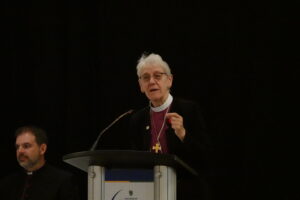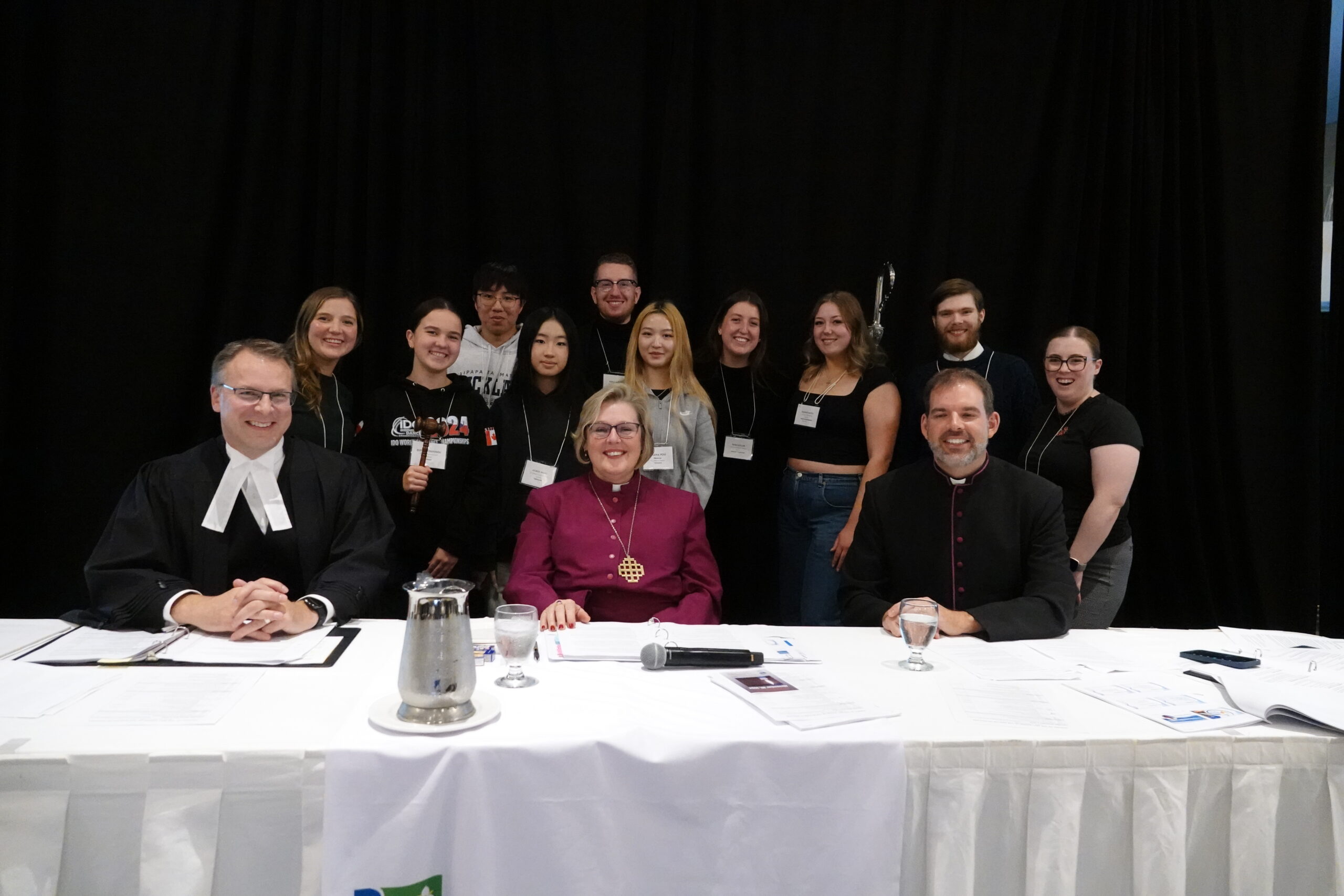November 2, 2024, marked a historic moment in the Diocese of Niagara — the 150th Synod! The theme for this year was ‘Faith in the Future’ inspired by Jeremiah 29:11, “For surely I know the plans I have for you, says the Lord, plans for your welfare and not for harm, to give you a future with hope.” The day inspired a hopeful look forward for the diocese.
 After a warm welcome from Bishop Susan Bell and territorial acknowledgment by Archdeacon Jeff Ward, the morning began with a gathering Eucharist. Bishop Bell then delivered her Charge to the 150th Synod reflecting on the progress made since the COVID pandemic. The bishop delivered words of praise and gratitude for the faithful service of the members of the diocese, “Well done, Niagara” she said.
After a warm welcome from Bishop Susan Bell and territorial acknowledgment by Archdeacon Jeff Ward, the morning began with a gathering Eucharist. Bishop Bell then delivered her Charge to the 150th Synod reflecting on the progress made since the COVID pandemic. The bishop delivered words of praise and gratitude for the faithful service of the members of the diocese, “Well done, Niagara” she said.
Before ending her charge, Bishop Bell, in conjunction with Dean Tim Dobbin, recognized the extraordinary service of Garfield Adams, Ellie Clitheroe, Malcolm French, Naomi Kabugi, and Tom Vaughan as honorary canons of Christ’s Church Cathedral.
After the morning break and the approval of both the credentials committee report and the consent agenda, the bishop acknowledged the generous support for the Synod by lead sponsor, Ecclesiastical Insurance. Ross and McBride and All Spec Building Inspections sponsored aspects of the Synod.
Dr. Emily Hill, parish development missioner, made a presentation on the renewal of the diocesan Mission Action Plan. She acknowledged that the success of the current plan was possible because it was embraced together, as a whole, not only as a goal-setting tool but as a means of discerning God’s plan for the communities of the diocese.
The Mission Action Plan (MAP) was designed as a living process, always adapting and growing. At the start of 2024, the diocese recognized the need to renew its Mission Action Plan goals and encouraged parishes to do the same. To support parishes, the diocese recently released a MAP 2.0 parish guide. “Here’s something to celebrate,” Hill said, “75% of parishes participated in the first MAP (2022-2024).”
Hill went on to highlight some of the remarkable parish stories that have emerged from the process including:
- Church of the Epiphany in Oakville, which developed a Death and Bereavement Film series fostering a meaningful space to explore death through shared learning, support, and faith-centered reflection on life and mortality.
- All Saints, Dain City, creating a thriving community garden and developing canning and cooking workshops to support it and the community.
- Grace Church in Waterdown, which launched the Graceful Abilities Day Program to support adults with physical and developmental disabilities providing an opportunity for community, belonging, and respite for families.
Looking forward, Hill shared the renewed priorities for MAP 2.0, keeping a Christ-centered focus on God’s mission as the top priority, followed by being a hope-filled and missionally focused diocese. Together, the priorities will guide the development of new contextual missions emerging from the gifts, needs, dreams, and desires of parishes and missions.
The process to renew the diocesan MAP gathered feedback from focus groups, surveys, prayer, and active listening. While the vision of the diocese remains the same (Called to Life – Compelled to Love), a minor revision to the diocesan’s mission statement was made. It is now: “Ignited by the irresistible love of Jesus and renewed by the Holy Spirit, we partner with God to deepen faith, join God’s mission, and care for God’s world.”
Members of synod voted in whole-heartedly in favour of the motion to affirm the renewal of the diocesan Mission Action Plan.
Following this inspiring moment, Chancellor Greg Tweney, and Archdeacon Bill Mous brought forward two proposed canon changes. Amendments to Canon 2.8 regarding the diocesan budget, and Canon 3.2 regarding Licensed Lay Workers were both carried.
New Diocesan Treasurer and Director of Finance, Christine Morrow addressed the Synod speaking on the 2023 Auditors report and the audited consolidated financial statements. This was followed by a motion to appoint KPMG as the auditors for 2024. The motion was carried without debate.
Bishop Bell was delighted to welcome Dr. Scott Brubacher, executive director of the Anglican Foundation of Canada, to share about the amazing work the foundation supports across the Diocese of Niagara and the Anglican Church of Canada. Brubacher shared that since 2010, the Anglican Foundation of Canada has provided $410,000 in support to the diocese, supporting community ministries, leadership and education, diverse infrastructure, Indigenous ministries, and sacred music and liturgical arts. Recent grants highlighted in his presentation included $15,000 to St. Luke’s in Smithville for an accessibility project, the Say Yes to Kids campaign which recently provided support to Canterbury Hills Camp, and $10,000 for a student leadership program with the Ecumenical Campus Ministry at the University of Guelph.
 In the afternoon, Bishop Bell welcomed Archbishop Linda Nicholls, recently retired primate of the Anglican Church of Canada, to speak on “This Anglican Communion of Ours.” The archbishop delivered an insightful perspective on the workings of the Anglican Communion drawing on her own inspiring, and thought-provoking experiences through her years of leadership and episcopal ministry.
In the afternoon, Bishop Bell welcomed Archbishop Linda Nicholls, recently retired primate of the Anglican Church of Canada, to speak on “This Anglican Communion of Ours.” The archbishop delivered an insightful perspective on the workings of the Anglican Communion drawing on her own inspiring, and thought-provoking experiences through her years of leadership and episcopal ministry.
Archdeacon Peter Scott and Treasurer Christine Morrow then presented the 2025 diocesan budget. They highlighted how, through Diocesan Mission & Ministry contributions, parishes build up the whole of God’s Church and support God’s mission locally to globally. The treasurer noted that revenues are expected to increase in 2025 which reflects our recovery from the pandemic. On the expenditure side, significant efforts were made to maintain costs as much as possible while maintaining the diocesan ministry capacity. Due to draws on reserve funds generously given as legacy gifts over the years, as well as a repayment of a mortgage, the diocese is projected to have an overall cash surplus in 2025.
“This sesquicentennial budget represents the Diocese of Niagara’s compelling witness of love and demonstrates there is continued growth in the energy and enthusiasm within parishes for leaning more deeply into Jesus-shaped living and discipleship that moves us closer to God’s reign,” said Archdeacon Peter Scott, chair of the budget committee. Members of Synod overwhelmingly passed the 2025 diocesan budget, representing an investment of 3.8 million dollars in ministry.
Deirdre Pike, diocesan program consultant for justice and outreach, and Bruce MacKenzie, chair of Climate Justice Niagara, spoke to Synod about the Communion Forest Initiative. Members learned about the number of partnerships required to support the growth of the Communion Forest in the diocese. With the support of the Anglican Foundation of Canada, Green Venture, and Neighbourwoods, Climate Justice Niagara involved seven parishes this year in the initiative. The process begins with the tree inventory, measuring and assessing health, and developing plans to protect and support them. The presentation highlighted wonderful stories of development focusing on tree planting at St. Paul’s, Westdale; St. David’s, Welland; a partnership with St. Christopher’s and St. John’s in Burlington; and the planting of a mini forest of over 400 trees at St. Paul’s, Caledonia.
Amy Collard and Susan Little, two of Niagara’s ten-member delegation for the Provincial Synod, shared a report about the recent Synod in Sault St. Marie. Together, they reflected on the theme of the Provincial Synod ‘Conversations at the Crossroads.’ The two discussed the three days of panel discussions and reports, presentations from The Primate’s Commission on Reimagining the Church, Bishop Bell on the Provincial Vocations Conference, the Anglican Foundation of Canada, the Primate’s World Relief and Development Fund (now Alongside Hope) and more.
The delegates noted how particularly impactful the visit to the Shingwauk Residential School site was sharing the history and the work it continues to inspire towards further truth and reconciliation.
They also shared that after the approval of a constitutional change, Canon Greg Tweney, was appointed to the newly established position of vice chancellor for the Ecclesiastical Province of Ontario, concurrently with his role as diocesan chancellor.
Amy Collard and Rob Towler will be representing the Diocese of Niagara for the next three years on the provincial executive council, along with Bishop Susan Bell.
In its final segment, Dean Peter Elliot joined the Synod on Zoom to engage members of Synod with the work of the Primate’s Commission on Reimagining the Church. The commission was announced at the 2023 General Synod by Archbishop Linda Nicholls, who asked the commission to think creatively about the church’s life, ‘reimagine’ what changes need to be made to structures and resources so that the gospel could continue to be at the centre of who we are, and to bring these recommendations to the General Synod in 2025. It is expected that this work will continue into the 2025-2028 triennium.
After spirited table discussions on the Commission’s seven hypotheses, Archdeacon Mous facilitated a brief report back. Members of synod shared that all the hypotheses would require considerable research, thought, discernment, and prayer. They suggested they might be reassessed with a more hopeful outlook to their impacts on the future. Archdeacon Mous encouraged everyone to complete the Commission’s public survey.
The bishop then reported on the selection of the regional representatives to Synod Council, as follows: for the region of Brock, Canon Pat Davis; for the Greater Wellington region, John Laidlaw; for Hamilton-Haldimand, Bev Groombridge; for Lincoln, Byron Nicholson; and for Trafalgar, Canon Malcolm French. These members were duly elected by Synod.
The results of the online election for delegates to General Synod, happening next June, were also shared. Representing the Order of Clergy are Dean Tim Dobbin, Archdeacon Bill Mous, and Archdeacon Terry Holub. Representing the Order of Laity are Susan Little, Amy Collard, and Adam McNeil.
Bishop Susan Bell then gave her assent to all the acts and resolutions brought forward to the 150th Synod of the Diocese of Niagara. The bishop closed with words of gratitude to those staff and volunteers who made the day happen and to the members of synod. Bishop Bell told members they are a blessing from God to this diocese, who so powerfully demonstrate that we truly are Called to Life and Compelled to Love.
The Convening Circular and list of resolutions, the proposed budget, and other documents can be found by visiting niagaranglican.ca/synod/2024.

Disability Theology and it’s Promise for our Church